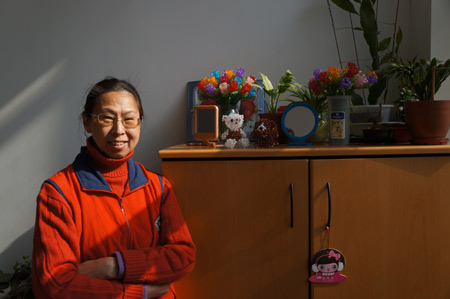Community service for psychiatric patients
- By Wu Jin
 0 Comment(s)
0 Comment(s) Print
Print E-mail China.org.cn, February 18, 2013
E-mail China.org.cn, February 18, 2013
 |
|
Song Xiaoyan, the resident of the Rosa Villa, stands beside the handcrafts made by her and her roommates. [China.org.cn by Wu Jin] |
Although China did not completely follow suit, it noted the importance in respecting the basic living rights of that group of people and recently issued its first mental health law. "It's a first step and it's good," Lorato commended.
Following the country's new trend in tending to this more vulnerable group of society, Lorato and his partners try to open more community rehabilitation centers in Tongling, Anhui Province, and Changchun, Jilin Province. Bai said one of the critical issues in managing the centers well, is to build a reliable legion of volunteers.
In Rosa Villa, they have five to six volunteers responsible for caring and cooking for the residents, as well as teaching them how to do so themselves. They are supposed to receive trainings both from PUIMH and overseas institutions, and some of them even speak fluent Italian.
"It's the love you both give and receive," Anna Zhang, a volunteer at Rosa Villa, said while cooking. A single Inner Mongolian woman aged 35, Zhang said she grasped the true notion of altruism while she was working there.
There is a great reciprocal love at the villa as many patients consider it to be home – and the staff their families. Zheng Tiejun suffered from mental illness and was supposed to go home for a family reunion during the Spring Festival for at least a week. But he soon returned when he realized he was unacceptable to his family, Bai said, therefore, he is back and saying "I have my home at Rosa Villa."
"The intermediate institutions between hospitals and families are too few for the psychiatric patients to make a full return into society in China," Bai said. And they are now making their efforts in tapping the notch.
"I hope to own a gallery of my own," said Zheng, who has a great interest in painting. He showed off many of his neatly depicted scenes, including one of Moscow, where he has never been.





